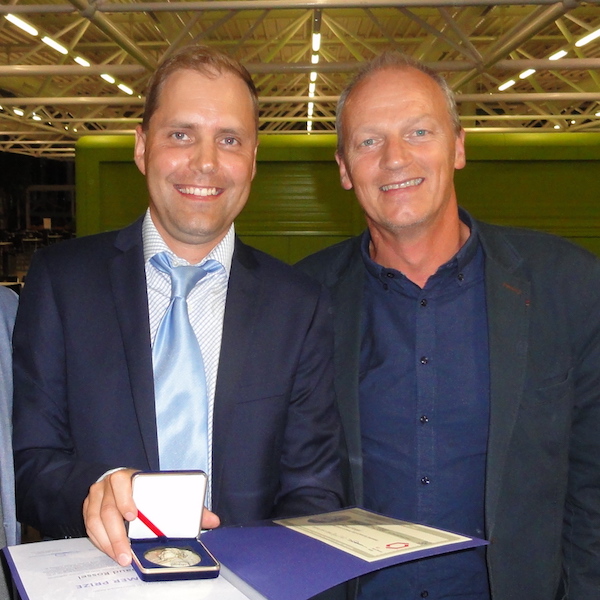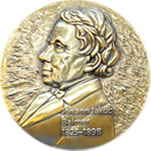 On the occasion of the dinner during the VSN Zentralkurs Chemie in Solothurn on October 17, 2018, David Spichiger, SCS Executive Director, handed over the medal and the certificate of the Balmer Prize 2018 to
On the occasion of the dinner during the VSN Zentralkurs Chemie in Solothurn on October 17, 2018, David Spichiger, SCS Executive Director, handed over the medal and the certificate of the Balmer Prize 2018 to
Dr. Thibaud Rossel,
Gymnase français de Bienne, École de Maturité, Spécialisée,
for his very original and impressive research program at the Gymnase Français where he teaches, using simple methods and resources and, even more impressively, the experiments are shared with high-school students, who are happy to carry-out original research work as part of their training in chemistry.
Thibaud earned his bachelor and master degrees in biology at Uni Neuchâtel in 2004 and 2006 respectively. From 2006 to 2011 he was a member of the Ward group at University of Basel and got the PhD degree for his research on 'Artificial Phosphate Transferases and Hydrogen Transferases Based on Biotin-Streptavidin Technology'. During his teaching activities at the Lycée Denis-de-Rougemont Neuchâtel in 2012-13 he earned an master of advanced studies in higher education and started his current position at the Gymnase français de Bienne filière MSp in 2013.
To illustrate the importance and innovation of Thubaud's project, Dr. Marc Creus, University of Basel, who work together with Thibaud during his PdD thesis highlighted his work as follows: «In my opinion, it is a real pity that normally students do not have the opportunity to experience the excitement of real science early-on. Therefore, the “Chimie en Couleurs” program that Thibaud has designed and implemented is a truly pioneering and successful program that should be further encouraged.»
We like to take the opportunity again to congratulate Thibaud for winning the Balmer Prize 2018.
Picture: Thibaud Rossel and Pierre-Etienne Zürcher, rector of the Gymnase français de Bienne
 Balmer Prize
Balmer Prize
Medal CHF 2'000 for individuals and CHF 2'000 for the school’s chemistry department and medal in bronze
The Balmer Prize is awarded for innovation in chemistry teaching to a teacher working in Switzerland or to a team of teachers working at the same school at the high school level.
The innovation must consist of an original didactic approach, experimental method or teaching practice and be readily applicable to everyday teaching at the high school level. The costs for materials must be modest.
David Spichiger, SCS
25.10.2018
